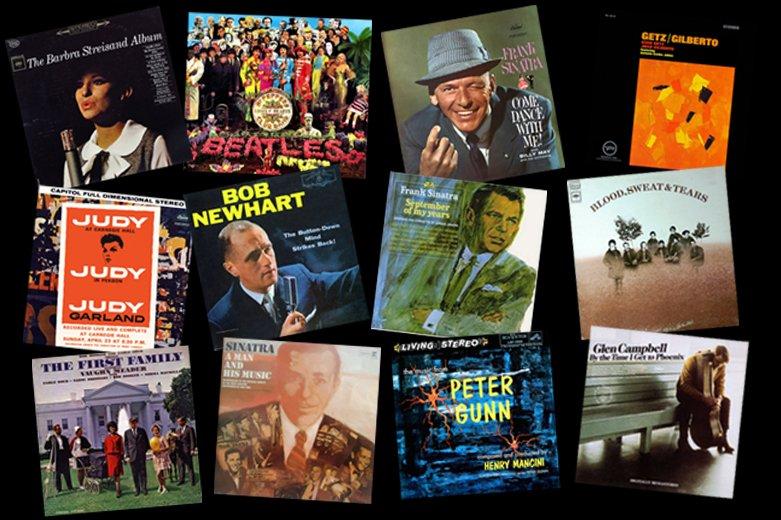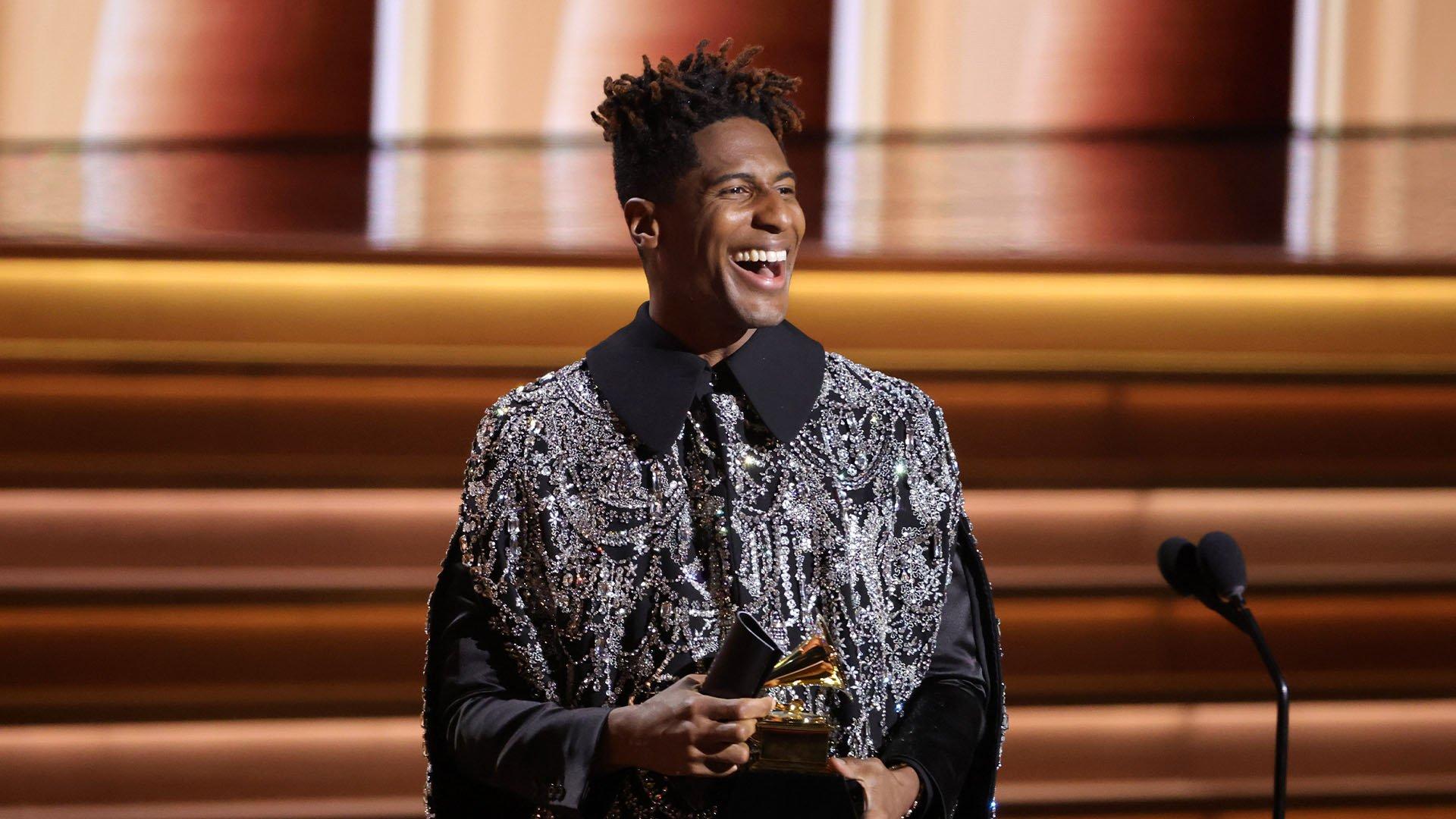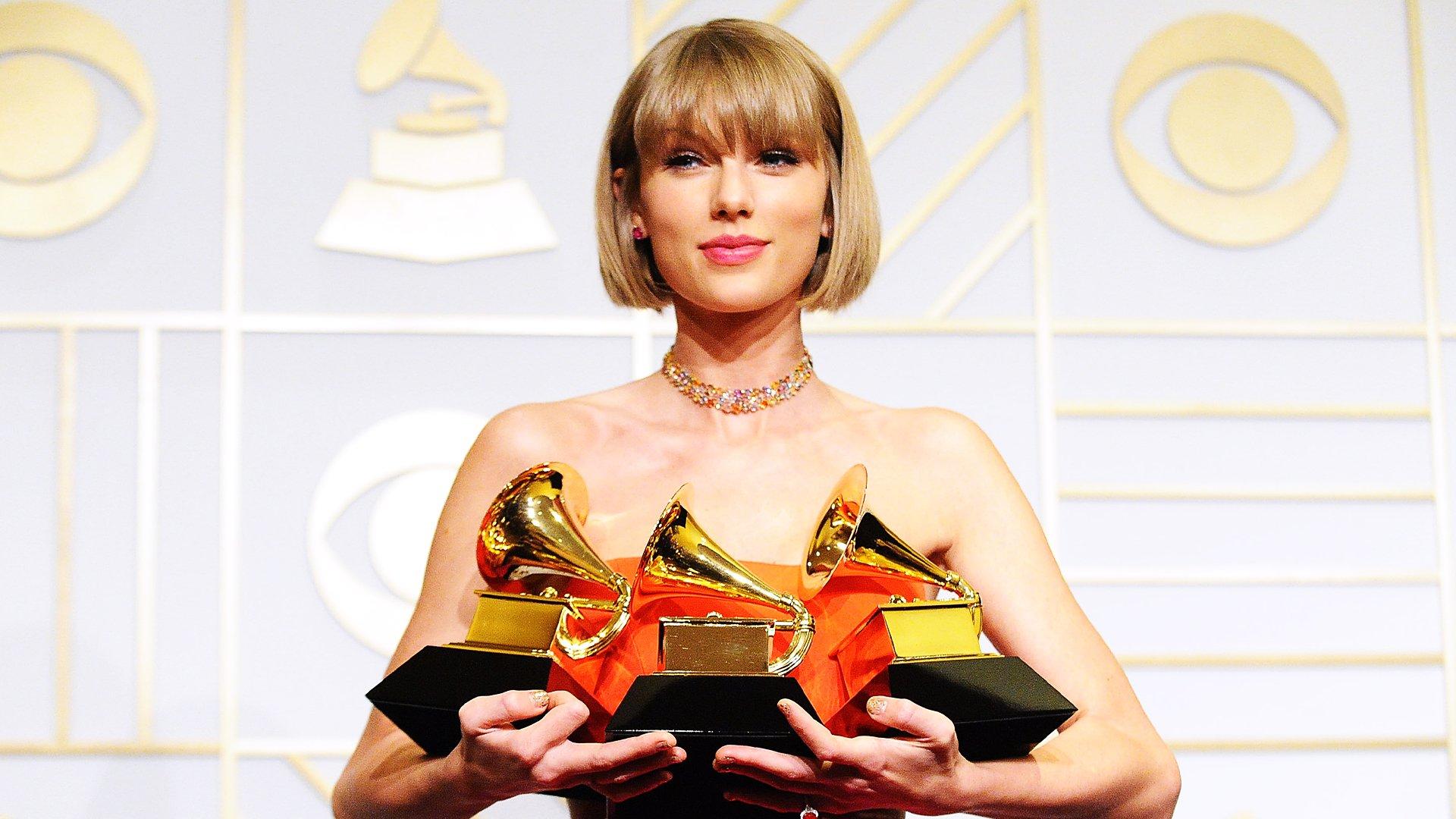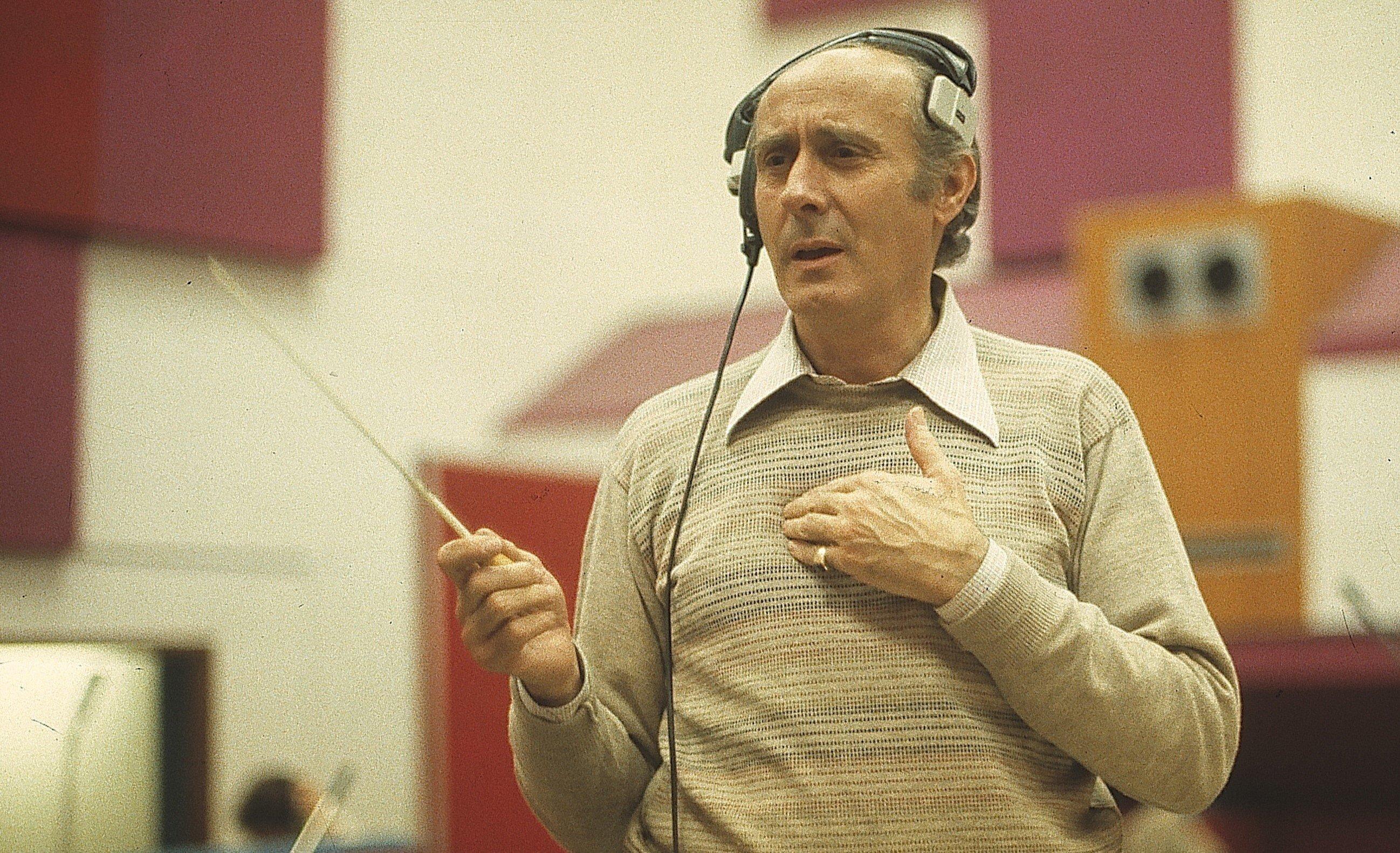An incalculable number of albums have been released in music history, but only 58 have earned the coveted distinction of Album Of The Year GRAMMY winner so far. From Henry Mancini's The Music From Peter Gunn to Taylor Swift's 1989, some of these elite albums have arguably surprised, some were seemingly consensus choices and still others have fostered lasting debate. In part one of Album Of The Year GRAMMY Winners, explore the albums that won — and were runners-up for — music's biggest prize for 1958–1969.
1958 ALBUM OF THE YEAR
The Music From Peter Gunn
Henry Mancini
"Peter Gunn," the noir-ish television detective series created by Blake Edwards, first aired in 1958 and was one of the first to feature an original score. Penned by composer Henry Mancini, the show's cool jazz strains became integral to the tone of the show. Mancini, only 34 at the time, was already a veteran film composer, having written for The Glenn Miller Story and The Benny Goodman Story. Over the years, "Peter Gunn"'s insistent show theme has been covered by artists of all genres (the Art Of Noise, Jimi Hendrix and Quincy Jones, among others), and remains one of the most recognized — and hippest — of all time.
Other Nominees:
Tchaikovsky: Concerto No. 1, In B-Flat Minor, Op. 23, Van Cliburn
Ella Fitzgerald Sings The Irving Berlin Song Book, Ella Fitzgerald
Come Fly With Me, Frank Sinatra
Only The Lonely, Frank Sinatra
1959 ALBUM OF THE YEAR
Come Dance With Me!
Frank Sinatra
One of the most successful and popular albums of Frank Sinatra's career, Come Dance With Me! features classic compositions by songwriting titans, including Lerner & Loewe ("I Could Have Danced All Night"), Irving Berlin ("Cheek To Cheek"), Sammy Cahn and Jule Styne ("Saturday Night [Is The Loneliest Night Of The Week]"), and Jerome Kern and Oscar Hammerstein ("The Song Is You"). Produced by Capitol Records' Dave Cavanaugh, and featuring iconic swing arrangements by Billy May, the album parked itself on Billboard's charts for more than two years.
Other Nominees:
Belafonte At Carnegie Hall, Harry Belafonte
Victory At Sea, Vol. 1, Robert Russell Bennett
Rachmaninoff Piano Concerto No. 3, Kiril Kondrashin, Van Cliburn and the Symphony Of The Air Orchestra
More Music From Peter Gunn, Henry Mancini
1960 ALBUM OF THE YEAR
The Button-Down Mind Of Bob Newhart
Bob Newhart
The Button-Down Mind Of Bob Newhart won out over some serious competition: Frank, Harry and Nat, as well as a pair of classical heavyweights. But remember — this was an era when comedy albums (including those by Shelley Berman, Allan Sherman and Vaughn Meader) were extraordinarily popular. How much so? The Button-Down Mind … topped the Billboard charts for weeks (even fending off Elvis Presley and the original cast album to The Sound Of Music). Newhart was also named Best New Artist, something never again achieved by a comedian, so far. Primarily known for his stand-up to this point, he became a major star when the Emmy-nominated "The Bob Newhart Show" debuted in 1972.
Other Nominees:
Belafonte Returns To Carnegie Hall, Harry Belafonte
Wild Is Love, Nat "King" Cole
Brahms: Concerto, Erich Leinsdorf and Sviatoslav Richter
Puccini: Turandot, Erich Leinsdorf
Nice 'N Easy, Frank Sinatra
1961 ALBUM OF THE YEAR
Judy At Carnegie Hall
Judy Garland
At this stage in her career, the 39-year-old Garland had shifted from performing in films to television, and was one of the highest-paid performers to appear in Las Vegas. But this double album — recorded at Carnegie Hall in New York on April 23, 1961 — reinvigorated her position as a singer of impressive vocal power, class and rarified status. A winner of four GRAMMYs, Judy At Carnegie Hall remains steadfastly popular to this day.
Other Nominees:
Genius + Soul = Jazz, Ray Charles
The Nat "King" Cole Story, Nat "King" Cole
West Side Story — Motion Picture Soundtrack, John Green
Breakfast At Tiffany's — Motion Picture Soundtrack, Henry Mancini
Great Band With Great Voices, Si Zentner and Johnny Mann Singers
1962 ALBUM OF THE YEAR
The First Family
Vaughn Meader
Beating out Tony Bennett's I Left My Heart In San Francisco was no small feat, but Vaughn Meader's The First Family was a smash-hit comedy album that sold an unheard-of 1 million copies in the fall of 1962. Clearly, Meader's lighthearted parody of life with the Kennedys struck a chord with Americans during the brightest days of Camelot. Ironically, only months later, the 5th Annual GRAMMY Awards show was preempted for coverage of John F. Kennedy's assassination. (Out of deference, Meader did not appear on the rescheduled telecast.)
Other Nominees:
I Left My Heart In San Francisco, Tony Bennett
Modern Sounds In Country And Western Music, Vol. 1, Ray Charles
Jazz Samba, Stan Getz and Charlie Byrd
My Son, The Folk Singer, Allan Sherman
1963 ALBUM OF THE YEAR
The Barbra Streisand Album
Barbra Streisand
By 1963, 20-year-old Barbra Streisand was just beginning to make a name for herself on the Broadway stage. It makes sense, then, that her debut solo album would feature selections from shows such as "The Fantasticks" and "A Taste Of Honey." With sweeping arrangements by Peter Matz (known for his work up to this point with Harold Arlen and Noël Coward) and works by Cole Porter and Rodgers & Hart, the collection kicks off with a moving take on "Cry Me A River" (written by Arthur Hamilton and made famous by torchbearer Julie London). The Barbra Streisand Album won three GRAMMY Awards, establishing Streisand as a musical force.
Other Nominees:
Honey In The Horn, Al Hirt
The Singing Nun, Soeur Sourire
Bach's Greatest Hits, the Swingle Singers
Days Of Wine And Roses, Andy Williams
1964 ALBUM OF THE YEAR
Getz/Gilberto
Stan Getz & João Gilberto
The 7th Annual GRAMMY Awards marked a time of change in the world of popular music — although the ceremony was still black tie and gown, the "longhairs" were starting to make some noise (the Beatles were named Best New Artist). And during this period, as silky bossa nova began to grace American hi-fi's, the pairing of tenor saxophone great Stan Getz and renowned Brazilian composer João Gilberto would take home Album Of The Year as well as Record Of The Year for its lilting single "The Girl From Ipanema," sung by Gilberto's wife, Astrud. Recorded in spring 1963, and impeccably produced by Creed Taylor and engineered by Phil Ramone, the album also features the immeasurable contribution of Brazilian guitarist/pianist Antonio Carlos Jobim.
Other Nominees:
Cotton Candy, Al Hirt
The Pink Panther, Henry Mancini
Funny Girl, Barbra Streisand, Bob Merrill and Jule Styne
People, Barbra Streisand
1965 ALBUM OF THE YEAR
September Of My Years
Frank Sinatra
In 1965 Frank Sinatra was at the top of his game: His albums were consistently touched by Midas, he was headlining Vegas with the Rat Pack and he was an established film star (Can-Can, Ocean's 11 and The Manchurian Candidate). He also made his debut as a film director with the release of None But The Brave. Produced by Reprise Records' Sonny Burke, Sinatra's reflective September Of My Years earned Album Of The Year honors, and one of its tracks — the Ervin Drake-penned "It Was A Very Good Year" — took home GRAMMYs for Best Vocal Performance, Male and Best Arrangement Accompanying A Vocalist Or Instrumentalist.
Other Nominees:
Whipped Cream & Other Delights, Herb Alpert's Tijuana Brass
The Sound Of Music — Motion Picture Soundtrack, Julie Andrews and Cast
My World, Eddy Arnold
Help!, the Beatles
My Name Is Barbra, Barbra Streisand
1966 ALBUM OF THE YEAR
A Man And His Music
Frank Sinatra
Only two artists — Stevie Wonder and Frank Sinatra — have captured the prestigious Album Of The Year GRAMMY in consecutive years. A Man And His Music is a double-disc retrospective of the Chairman's career up to 1965, particularly noteworthy in that the year marked his 50th birthday. Because many of the songs had been previously released on his former labels (including RCA, Columbia and Capitol), Sinatra chose to re-record them and release the album on Reprise Records, the label he founded in 1958. A TV special of the same name would capture Emmy and Peabody awards.
Other Nominees:
What Now My Love, Herb Alpert And The Tijuana Brass
Revolver, the Beatles
Dr. Zhivago — Motion Picture Soundtrack, Maurice Jarre
Color Me Barbra, Barbra Streisand
1967 ALBUM OF THE YEAR
Sgt. Pepper's Lonely Hearts Club Band
The Beatles
For three years in a row, Frank Sinatra and the Beatles would be nominated for Album Of The Year, with Sinatra capturing it twice. But with their epic psychedelic trip Sgt. Pepper's Lonely Hearts Club Band, the Beatles would reign supreme for 1967. The group had for the most part retired from touring by 1966, choosing to instead retreat to Abbey Road Studios and its newfound technological advances. Sgt. Pepper's ... — whose memorable collage artwork cover won the GRAMMY for Best Album Cover, Graphic Arts — became one of the most influential albums in rock history, opening doors for other recording artists to the infinite possibilities of studio recording.
Other Nominees:
My Cup Runneth Over, Ed Ames
It Must Be Him, Vikki Carr
Ode To Billie Joe, Bobbie Gentry
Francis Albert Sinatra & Antonio Carlos Jobim, Frank Sinatra and Antonio Carlos Jobim
1968 ALBUM OF THE YEAR
By The Time I Get To Phoenix
Glen Campbell
After years as one of the busiest on-call sidemen in the music business (including service as a touring member of the Beach Boys as well as the acclaimed Phil Spector-favored "Wrecking Crew" session players), Glen Campbell began to stretch out on his own as a country solo artist. The year prior to Campbell's win for Album Of The Year, he brought home four GRAMMYs for the tracks "Gentle On My Mind," written by John Hartford, and "By The Time I Get To Phoenix," written by Jimmy Webb. The latter was one of the first of many successful partnerships between Webb and Campbell, including the classics "Wichita Lineman" and "Galveston."
Other Nominees:
Magical Mystery Tour, the Beatles
Feliciano!, José Feliciano
A Tramp Shining, Richard Harris
Bookends, Simon And Garfunkel
1969 ALBUM OF THE YEAR
Blood, Sweat & Tears
Blood, Sweat & Tears
Every album nominated in 1969 remains an essential listen, especially the winner. Featuring pop hits "And When I Die" (written by Laura Nyro), "Spinning Wheel" and "You've Made Me So Very Happy" — as well as the delicate "Variations On A Theme By Erik Satie" — Blood, Sweat & Tears' second album is an accessible mix of rock, jazz, R&B, and classical that showed rock could sample from many palettes as it entered the '70s. The group's massive, ever-rotating lineup was akin to a superstar big band with long hair and bell-bottoms: This recording features vocalist David Clayton-Thomas, guitarist Steve Katz, alto sax/piano man Fred Lipsius, drummer Bobby Colomby, and bassist Jim Fielder.
Other Nominees:
Abbey Road, the Beatles
Johnny Cash At San Quentin, Johnny Cash
Crosby, Stills & Nash, Crosby, Stills & Nash
The Age Of Aquarius, 5th Dimension





